There’s a lot of conflicting information on the internet about whether you can use coconut oil on faux leather. Some people say it works great, while others say it will ruin your furniture. So, what’s the truth? In this article, we’ll explore all of the pros and cons of using coconut oil on faux leather so that you can make an informed decision for yourself. We’ll also provide some tips on how to care for your furniture if you decide to give coconut oil a try!
Faux Leather in General
Faux leather is a popular material used in shoes, furniture, clothing, and other products. It looks like real leather but is made from synthetic materials like polyurethane or vinyl. Faux leather has many of the same qualities as genuine leather – it’s durable, water-resistant, and easy to clean.
However, because faux leather isn’t actual animal hide, it doesn’t require the same kind of cleaning or maintenance as genuine leather does. Generally speaking, you can spot clean faux leather with warm soapy water. But if you want to condition your faux leather items to prevent them from drying out and cracking over time, you should use a specially formulated product specifically designed for treating faux leather. [1] [2] [3] [4]
Coconut Oil and Its Uses
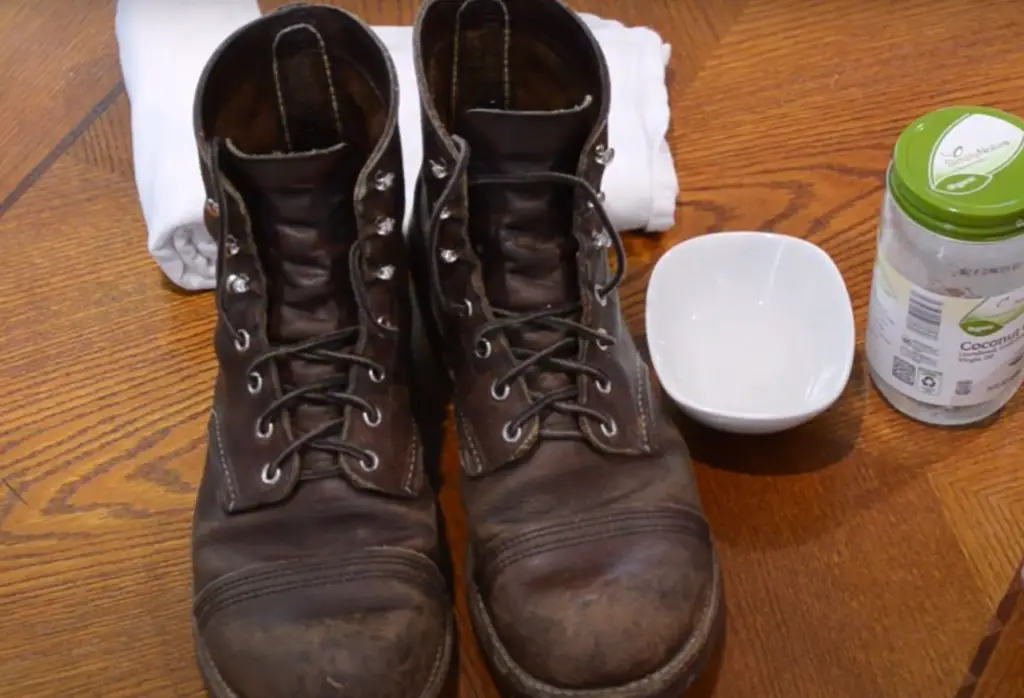
Additionally, it has been shown to have antimicrobial properties against certain bacteria and fungi, making it an excellent choice for treating fungal infections such as athlete’s foot. [1] [2]
Is Coconut Oil Safe For Use on Faux Leather?
All this leads us to the question of whether coconut oil is safe to use on faux leather. The answer to this question is generally yes, but there are a few caveats. To help you make a decision on whether or not to use coconut oil on faux leather, here are a few important factors to consider.
Advantages of Coconut Oil
We will begin by looking at the advantages of using coconut oil on faux leather. Coconut oil is often used as a natural lubricant, cleaning agent, and conditioner for many types of materials, including leather. And it can help you to maintain your leather items in a good condition for a while. So let’s discuss all the pros that coconut oil can provide you!
It’s accessible
One of the main advantages of using coconut oil on faux leather is that it’s easily accessible. Coconut oil can be found in most grocery stores and is relatively inexpensive. This means that you don’t have to go out of your way to find a special cleaner or conditioner for your faux leather items.
This puts it ahead of traditional leather care products, which can be difficult to find and quite expensive. So if you’re looking for an effective and accessible way to clean and condition your faux leather items, coconut oil is a great option.
It is a great moisture repellant
Another advantage of using coconut oil on faux leather is that it can help to repel moisture. Faux leather is not waterproof and will absorb water if left unprotected. This can lead to staining, discoloration, and even damage to the material itself over time.
But by applying a thin layer of coconut oil to your faux leather items, you can create an effective barrier against moisture. This will help to keep your items looking like new for much longer!
It works as a great conditioner
As we already mentioned, coconut oil is a great conditioner for faux leather. It helps to restore the natural oils that have been lost over time and keep your faux leather items looking good and feeling soft and supple. When used regularly, it can help to maintain or even improve the appearance of your faux leather pieces.
Additionally, when used in small quantities, coconut oil won’t leave an oily residue on the surface of your faux leather pieces. This means that there’s no need to worry about any unsightly stains after use.
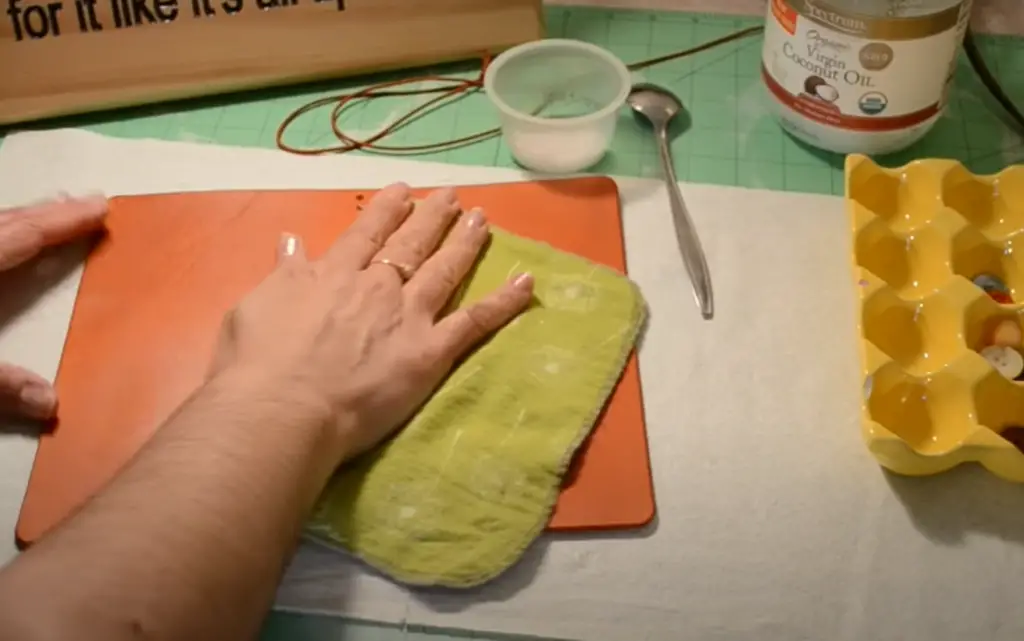
It’s hypoallergenic
Another advantage of using coconut oil on faux leather is that it’s hypoallergenic. Most traditional cleaners and conditioners contain harsh chemicals or dyes, which can cause allergic reactions in some people. Coconut oil, on the other hand, is completely safe and hypoallergenic, making it an ideal choice for those with sensitive skin.
Plus, since coconut oil doesn’t contain any strong fragrances or dyes, it won’t leave a chemical odor on your items. This makes it a great option for anyone looking for a gentle cleaner or conditioner that won’t irritate their skin or affect their senses.
It’s natural
Another huge benefit of using coconut oil on faux leather is that it’s completely natural. Unlike some synthetic cleaners or conditioners, coconut oil doesn’t contain any harsh chemicals or dyes that can damage the material over time. This makes it perfect for cleaning delicate materials like faux leather without risking damage to the material itself.
In addition, many people prefer natural alternatives when it comes to cleaning and caring for their belongings. So if you’re looking for a safe and natural way to care for your faux leather items, coconut oil is a great option.
It gives your leather a nice sheen
Coconut oil can also give your faux leather a nice sheen. After applying coconut oil, you’ll be able to notice a subtle shine that will bring out the best in your faux leather items. It won’t be overly glossy, but it will add an attractive luster that can help enhance the appearance of your items.
Faux leather doesn’t give much of a natural leather shine, so coconut oil is a great way to add some shine and luster without going overboard.
It’s a multipurpose product
Finally, another advantage of using coconut oil on faux leather is that it’s quite versatile. Not only can you use it to clean and condition your faux leather items, but you can also use it as a lubricant or even as an insect repellent. This makes it an incredibly useful product to have around the house, especially if you’re looking for natural alternatives.
So if you’re looking for a multipurpose cleaning agent that’s accessible, natural, and effective on faux leather, then coconut oil may be just what you need! [1] [2] [4]
Downsides of Coconut Oil
While coconut oil is a great option for cleaning and conditioning your faux leather items, there are also some potential downsides to consider.
It is vulnerable to extreme temperatures
One potential downside of using coconut oil on faux leather is that it can be vulnerable to extreme temperatures. Or rather the cold temperatures can cause issues. In low temperatures, coconut oil can solidify and potentially damage the faux leather surface.
And not only that but even spreading it can become a problem if the surrounding temperature is too cold.
So how do you avoid this problem? The best solution is to make sure that you store your coconut oil in a warm area where temperatures won’t fluctuate too wildly. This way, it will remain in a liquid state and be ready for use whenever needed.
In addition, you can safely warm coconut oil up to help make it easier to spread on the surface of your faux leather. Just be sure to do this carefully, as too much heat can also damage the material.
It can darken the leather
Another potential downside of using coconut oil on faux leather is that it can darken the material. While this won’t be an issue for some people, if you prefer a lighter shade of faux leather then it’s something to be aware of.
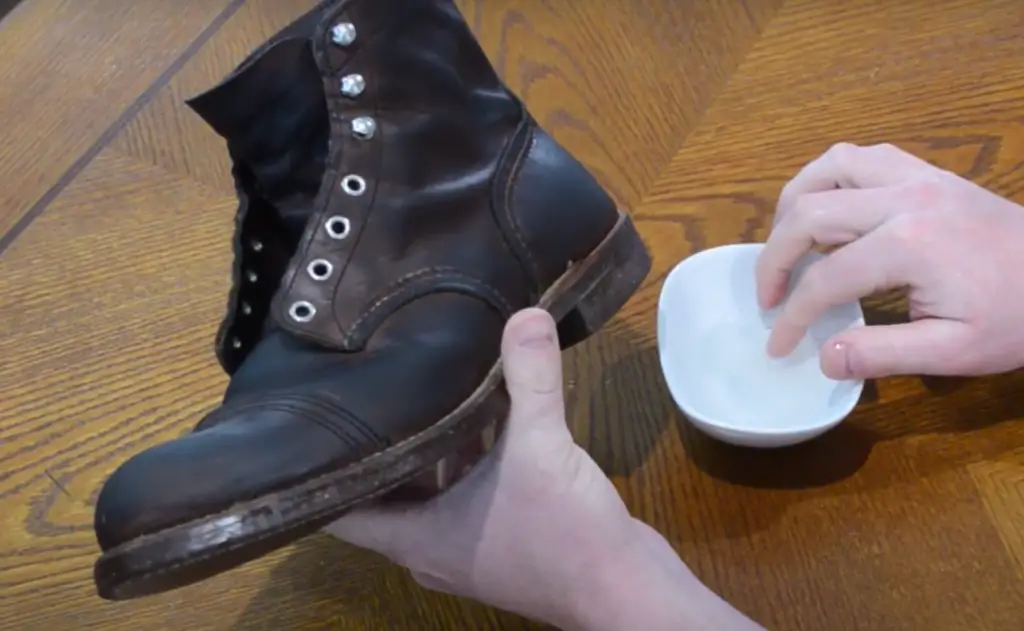
And even though it can darken the material, many people find that this isn’t necessarily a bad thing since it gives their items a nice worn-in look. So if you’re after a more vintage look, then this could be beneficial.
Its smell is quite controversial
Finally, another potential downside of using coconut oil on faux leather is the fact that it has a quite strong smell. Some people absolutely love its sweet and tropical scent, while others may find it overbearing and even obnoxious.
So if you’re sensitive to smells or don’t like the smell of coconut oil, then this might not be the best choice for you. Fortunately, the smell will disappear with time but it’s still a point you may want to keep in mind. [1] [2] [4]
How to Properly Apply Coconut Oil on Leather
Still, wondering how you can use coconut oil on faux leather? Here are some detailed tips and tricks to help you out.
Clean your item properly
The best way to ensure the coconut oil is properly absorbed into the faux leather is to make sure the item is clean and completely free of dirt, dust, and other debris. You can use a damp cloth or brush to gently wipe away any dirt. Once you are done cleaning, allow the item to dry in a well-ventilated area before applying coconut oil.
Load the coconut oil on the clean cloth
Next, you need to load the coconut oil onto a clean, soft cloth. You want to make sure there is enough oil on the cloth that it will be able to spread across the surface of your faux leather item.
Keep in mind that you will need to warm the oil up before you use it. This will ensure that the oil is able to penetrate deeper into the faux leather.
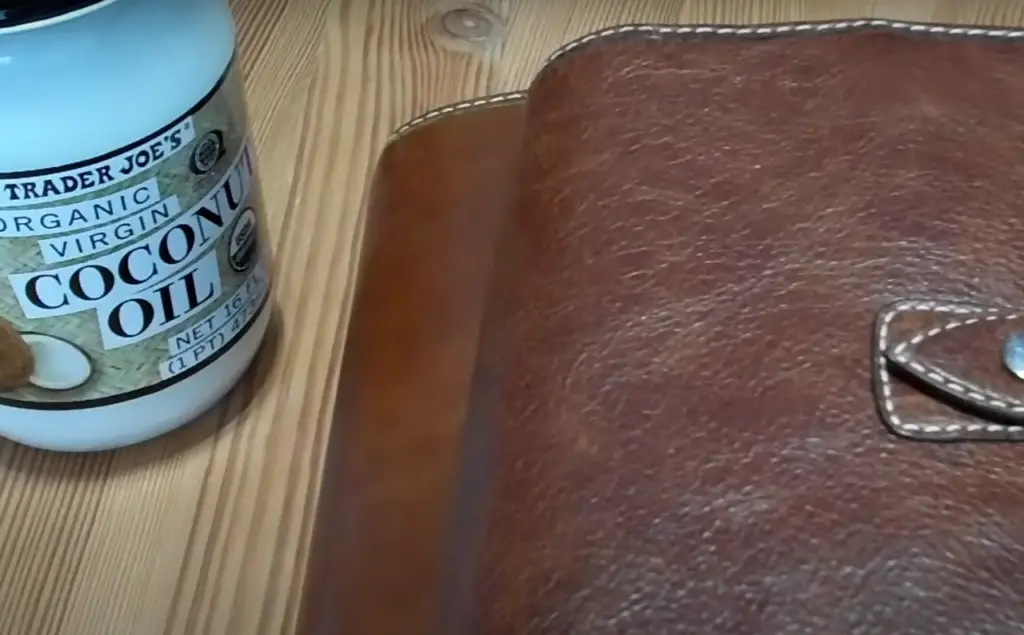
Apply the coconut oil to your item:
- Once you are ready, gently rub the warm, loaded cloth onto your faux leather item. Move in a circular motion to ensure that all areas of your item are covered with coconut oil. Continue doing this until you have applied enough coconut oil to reach an even finish;
- You may want to leave some parts of your item lightly coated because too much coating can make it appear greasy and unappealing;
- When finished, buff the faux leather with a dry cloth to remove any excess coconut oil. And let the item air dry;
- Now you’ve successfully applied coconut oil on faux leather! Enjoy the soft and supple feel of your newly protected item;
- Keep in mind that you absolutely should avoid applying coconut oil on the leather itself, as this can cause it to discolor and stain. If you’re not sure, always test a small area first before using coconut oil on your item [1] [2] [3] [4];
FAQ
How do you moisturize faux leather?
Coconut oil is perfect for use on faux leather because it will not stain or damage the material like other products might. It also helps seal in moisture and keep your faux leather looking and feeling beautiful over time. To use coconut oil on your faux leather item, simply take a soft cloth or paper towel and apply some of the oil to it. Then, gently rub the cloth onto the surface of the faux leather item in circular motions. Once the oil has been applied, use a clean cloth to buff it in and shine it up. You should apply coconut oil every six weeks or so to ensure your faux leather item stays looking its best.
Do you need to condition faux leather?
No, you don’t need to condition faux leather, as it is already treated with a protective coating. However, if your faux leather has started to look dull or faded, there are some products you can use to restore its shine and luster.
And you still need to clean it regularly, as you would with any other type of leather material. You can use a mild cleanser and warm water to gently remove dirt, dust, and debris from your faux leather fabric.
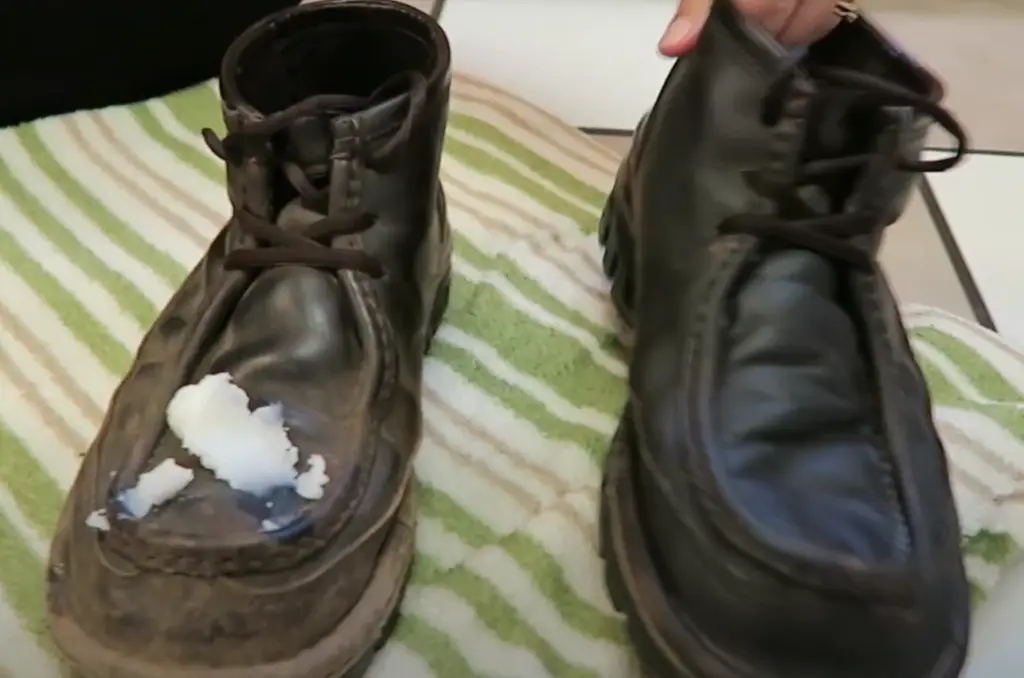
What should you not use on faux leather?
Most faux leather products are made from polyurethane or plastic, and should not be treated with solvents and cleaners made for use on genuine leather. And there really is no need to condition faux leather or use oil-based products such as coconut oil on it. In fact, these types of treatments can actually damage the product’s surface and cause it to crack, discolor, and/or peel over time.
And obviously, you should avoid using any kind of harsh chemicals and cleaners on the material. Soap and water are generally all you need to clean and care for faux leather furniture, shoes, bags, and other products. Certain faux leathers may be able to handle a gentle cleaner made specifically for use on polyurethane or vinyl surfaces. Just make sure you read the directions first and test it in an inconspicuous area before cleaning the entire product with it.
If your faux leather items have wrinkles or creases that won’t come out with regular cleaning or wear, then you can try steaming them lightly from the wrong side of the fabric with a handheld steamer (not boiling water). This should help bring some life back into them without risking any damage to the surface.
Does coconut oil darken faux leather?
The short answer is “no.” Coconut oil does not darken faux leather. Faux leather is made of synthetic materials, such as polyvinyl chlorides (PVCs) or polyurethanes, and is not affected by coconut oil. To darken faux leather, you’ll need to apply a specific product designed for that purpose, like a specialized dye or sealant. Applying coconut oil to faux leather may change its texture slightly, but it won’t darken the material.
When applying any kind of product to your faux leather item, always do a spot test in an inconspicuous area first to make sure you’re happy with the results before treating the entire piece.
Does faux leather absorb oil?
Faux leather, also known as synthetic leather or vegan leather, is a man-made fabric created to resemble the look and feel of real leather but without using animal products. While traditional genuine leather absorbs oil, faux leather does not have this ability since it is made from plastic and other synthetic materials that are not porous like natural fibers. As such, any type of oil, including coconut oil, will remain on the surface of the material without being absorbed into it. This can create an oily residue on the surface which may attract dirt and dust over time.
It’s important to note that even though faux leather does not absorb oils, some types can still be susceptible to staining if left untreated for too long or when exposed to certain types of oils. To prevent staining, it’s recommended that you use a protective coating on the surface of your faux leather items before using any kind of oil or cleaning product.
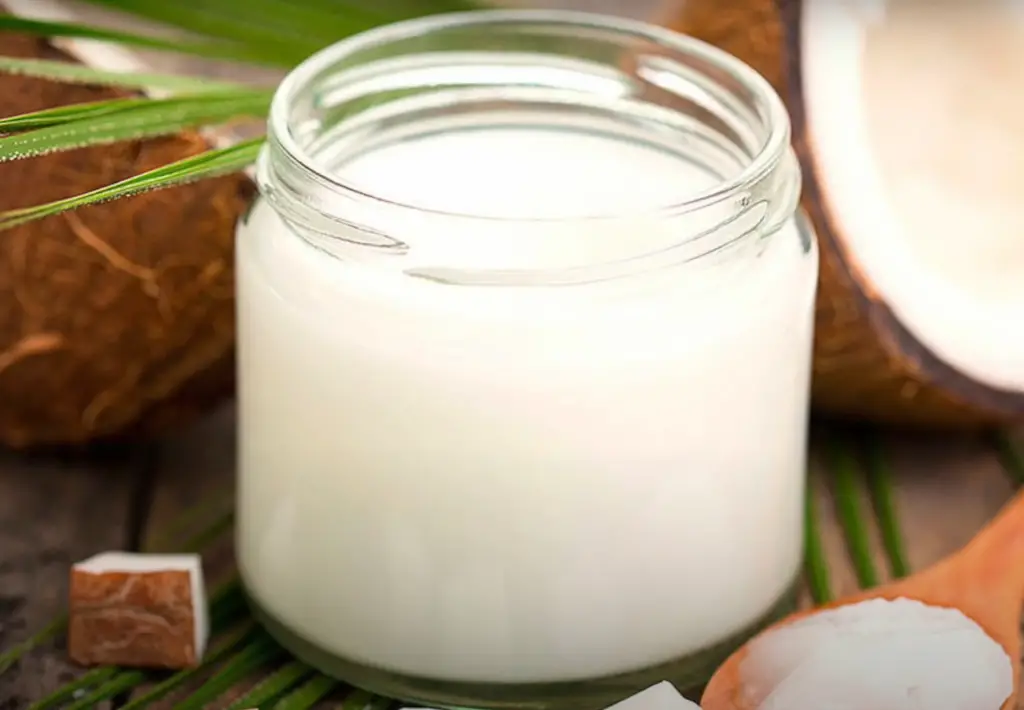
What is the best thing to clean faux leather with?
If you’re dealing with tough stains, we suggest you use a pH-neutral detergent, such as non-detergent soap or an all-purpose cleaner. Again, be sure to use a damp cloth and rinse the area well after cleaning.
Useful Video: Tutorial on to use Coconut Oil to condition a leather fauxdori
Conclusion
When it comes to taking care of faux leather, you are left with quite a few options. Coconut oil is one of them, but can you use it? The answer is yes, you can. Coconut oil is an effective and multipurpose product for cleaning and conditioning faux leather items. It gives your items a nice sheen without making them too glossy and it can also be used as a lubricant or insect repellent.
That being said, there are some potential downsides to consider such as its vulnerability to extreme temperatures and the fact that it may darken the material slightly. However, these issues can usually be avoided with proper use and storage of the product.
All in all, if you’re after a natural alternative for taking care of your faux leather items then coconut oil is definitely worth considering!
References:
- https://favoredleather.com/can-you-use-coconut-oil-on-faux-leather/
- https://materialsix.com/can-you-use-coconut-oil-on-leather/
- https://www.angeljackets.com/guides/how-to-care-for-faux-leather/
- https://homedecorbliss.com/use-coconut-oil-on-leather-and-faux-leather/

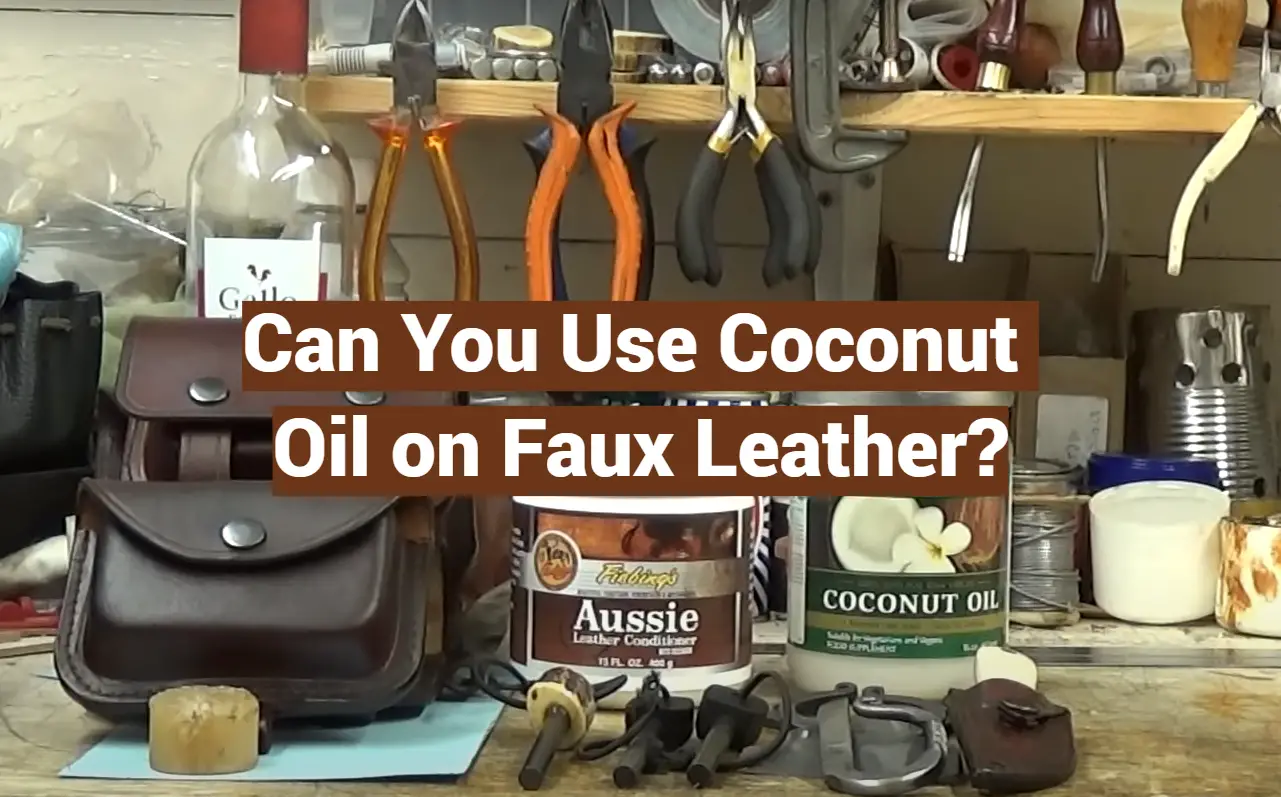


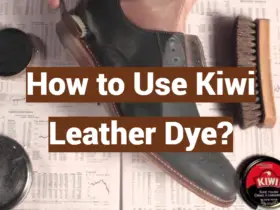


Leave a Reply